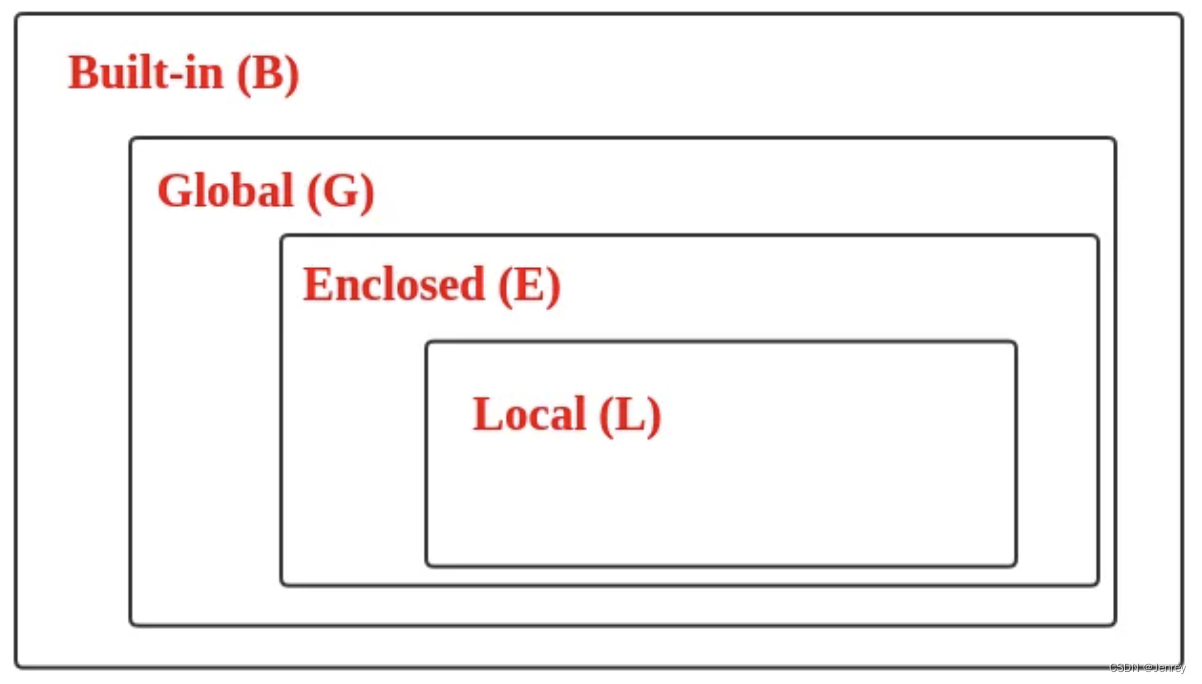通过 LEGB 规则掌握 Python 范围Scope
通过 LEGB 规则掌握 Python 范围(Master Python Scope by the LEGB Rule)
文章目录
Introduction 导言
变量作用域variables scope(或 命名空间namespace)是编程语言中一个非常基本的概念。每个开发人员,无论使用哪种语言,都知道局部变量local variables和全局变量global variables的定义。然而,在 Python 中,情况变得有些复杂。以下问题在 Python 开发人员的面试中出现过很多次:
- 为什么Python需要非局部
nonlocal关键字? - 什么是 LEGB 规则?
- Python 中 全局变量global variables 和 非局部变量nonlocal variables 的区别?
- Python 中有多少种变量variables?
- …
本篇文章将由浅入深地讲解 Python 的作用域scope。阅读后,您将完全掌握这一重要概念。
四类变量和 LEGB 规则 Four Types of Variables and the LEGB Rule
LEGB 规则定义了 Python 解释器interpreter检索变量名的顺序。这四个字母代表 Python 中的四种变量variables类型:
- 局部变量Local Variables (L): 函数中的变量Variables in a function
- 闭包变量或封闭变量Enclosed Variables (E): 在嵌套函数的上下文中In the context of nested functions
- 全局变量 Global Variables(G):最上层变量The uppermost level variables
- 内置变量 Built-in Variables (B): Python内置模块中的变量Variables in Python built-in modules

在程序中调用命名变量时,将在本地local、封闭enclosing、全局global和内置built-in作用域中scope依次检索对应的变量。如果命名变量存在,那么将使用第一个出现的变量。否则,将引发错误 raise error。
让我们来看一个例子:
name = "Zhang"
def print_name():
name = "Python Guru"
print(name)
print_name() # Python Guru
print(name) # Zhang
如上例所示,函数function print_name() 调用了局部变量local variable name 。函数function print() 调用了全局变量global variable name 。
掌握全局关键词Global Keyword
如果我们要修改函数function中的全局变量global variable name ,则需要使用 global 关键字keyword的语句statement。
name = "Zhang"
def print_name():
global name
name = "Python Guru"
print(name)
print_name() # Python Guru
print(name) # Python Guru
掌握非局部关键字Nonlocal Keyword
封闭变量enclosing variables的概念是在嵌套函数nested functions的上下文中提到的。对于内层函数inner functions来说,外层函数outer functions中的变量既不是局部变量local variables,也不是全局变量global variable,而是 非局部变量nonlocal variables也称为封闭变量enclosing variables。例如:
name = "Zhang" # global variable
def outer_func():
name = "Python Guru" # enclosing variable
def inner_func():
name = "Tech Leader" # local variable
print(name)
inner_func() # inner_func prints its local variable
# will print "Tech Leader"
print(name) # print the enclosing variable
# will print "Python Guru"
return
outer_func()
# Tech Leader
# Python Guru
print(name) # print the global variable
# Zhang
如上所示,三个不同的名称代表三种不同类型的变量variables,它们由 LEGB 规则调用。
如果我们想在内部函数inner function中更改非本地变量nonlocal variable的值,则需要使用 nonlocal 关键字。
name = "Zhang" # global variable
def outer_func():
name = "Python Guru" # enclosing variable
def inner_func():
nonlocal name
name = "Tech Leader" # local variable
print(name)
inner_func() # inner_func prints its local variable
# will print "Tech Leader"
print(name) # print the enclosing variable
# will print "Tech Leader"!!!
return
outer_func()
# Tech Leader
# Tech Leader
print(name) # print the global variable
# Zhang
该语句与 global 关键字语句一样简单。
Conclusion结论
LEGB 规则定义了 Python 查找变量的顺序。
如果我们要在函数中改变全局变量global variable,需要 global 语句。
如果我们要在内部函数inner function中改变非局部变量nonlocal variables也称为封闭变量enclosing variables(你也可以理解为外层变量),则需要 nonlocal 语句。
本文来自互联网用户投稿,该文观点仅代表作者本人,不代表本站立场。本站仅提供信息存储空间服务,不拥有所有权,不承担相关法律责任。 如若内容造成侵权/违法违规/事实不符,请联系我的编程经验分享网邮箱:chenni525@qq.com进行投诉反馈,一经查实,立即删除!